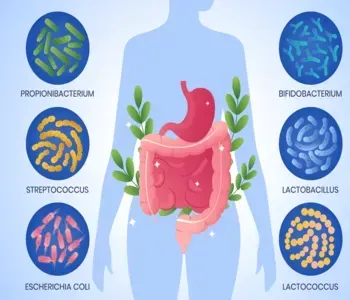What is Gut Microbiota?
The gut microbiota is a complex community of microorganisms residing in the digestive tracts of humans. It comprises trillions of bacteria, viruses, fungi, and other microbes. The majority of these bacteria are found in the colon, and they exist in a delicate balance, contributing to our health in numerous ways.
Prevalence of Digestive Issues Due to Gut Bacteria
According to the World Health Organization (WHO) and various U.S. health statistics, digestive diseases are a significant health concern, affecting millions of people. Here are some key statistics:
Irritable Bowel Syndrome (IBS) affects approximately 11% of the global population, with gut bacteria imbalances being a key factor in its development. In the United States, IBS affects about 10-15% of adults.
Inflammatory Bowel Disease (IBD), which includes Crohn's disease and ulcerative colitis, affects about 1 in 250 people globally. In the U.S., around 3 million people are diagnosed with IBD.
Clostridioides difficile (C. diff) infections, caused by harmful bacteria overgrowth, result in nearly half a million infections and about 29,000 deaths annually in the United States.
According to the American Gastroenterological Association, digestive diseases account for over 100 million ambulatory care visits annually in the U.S.
The National Institutes of Health (NIH) reports that approximately 60-70 million Americans are affected by digestive diseases, contributing to significant healthcare costs and impacting quality of life.
How Gut Bacteria Aid Digestion
Breaking Down Food: Gut bacteria assist in breaking down complex carbohydrates, fibers, and proteins that our stomach and small intestine cannot digest. This process, called fermentation, occurs mainly in the colon. Through fermentation, bacteria produce short-chain fatty acids (SCFAs) like acetate, propionate, and butyrate, which serve as energy sources for the cells lining the colon.
Vitamin Synthesis: Certain gut bacteria synthesize essential vitamins, such as vitamin K and some B vitamins (B12, riboflavin, and folate). These vitamins play vital roles in blood clotting, energy production, and the maintenance of healthy nerve and brain functions.
Maintaining Gut Integrity: The gut barrier is a critical component of the digestive system, preventing harmful substances from entering the bloodstream. Gut bacteria contribute to the integrity of this barrier by promoting the production of mucus and tight junction proteins that seal the spaces between epithelial cells.
Immune System Support: A significant portion of the body's immune system resides in the gut. Gut bacteria interact with immune cells, training them to distinguish between harmful pathogens and harmless substances. This interaction helps develop a robust immune response and prevents inflammatory and autoimmune diseases.
Gut-Brain Axis
The gut and brain communicate through a bidirectional pathway known as the gut-brain axis. Gut bacteria produce neurotransmitters like serotonin and gamma-aminobutyric acid (GABA), which influence mood, stress response, and overall mental health. An imbalance in gut bacteria, known as dysbiosis, has been linked to mental health conditions such as anxiety, depression, and even neurodegenerative diseases.
Factors Affecting Gut Microbiota
Diet: Diet is one of the most significant factors influencing the composition of gut microbiota. A diet rich in fiber, fruits, vegetables, and fermented foods promotes a diverse and healthy microbiota. Conversely, a diet high in processed foods, sugar, and unhealthy fats can lead to dysbiosis.
Antibiotics: While antibiotics are essential for treating bacterial infections, they can also disrupt the balance of gut bacteria. Prolonged or unnecessary use of antibiotics can wipe out beneficial bacteria, leading to digestive issues and an increased risk of infection.
Age: The composition of gut microbiota changes with age. Infants acquire their initial microbiota from their mothers during birth, and it continues to evolve throughout their lives. Elderly individuals tend to have a less diverse microbiota, which can affect their digestive health.
Lifestyle: Stress, lack of sleep, and a sedentary lifestyle can negatively impact gut health. Engaging in regular physical activity, managing stress, and getting adequate sleep are essential for maintaining a healthy gut microbiota.
Improving Gut Health
Probiotics and Prebiotics: Probiotics are live beneficial bacteria found in fermented foods like yogurt, kefir, and sauerkraut, as well as dietary supplements. They can help restore the balance of gut microbiota. Prebiotics, on the other hand, are non-digestible fibers that feed beneficial bacteria. Foods rich in prebiotics include garlic, onions, leeks, asparagus, and bananas.
Balanced Diet: Consuming a diverse range of foods ensures that different types of bacteria can thrive in your gut. Incorporate plenty of fruits, vegetables, whole grains, and lean proteins into your diet.
Avoiding Unnecessary Antibiotics: Only use antibiotics when prescribed by a healthcare professional. If antibiotics are necessary, consider taking probiotics to mitigate their impact on gut bacteria.
Regular Exercise: Physical activity has been shown to promote a healthy gut microbiota. Aim for at least 30 minutes of moderate exercise most days of the week.
Stress Management: Meditation, yoga, and deep-breathing exercises can reduce stress and positively impact gut health.
Conclusion
The gut microbiota is a dynamic and integral part of our digestive system. By understanding the role of gut bacteria in digestion and overall health, we can take proactive steps to support a healthy gut. This, in turn, can lead to improved digestion, better immunity, and enhanced mental well-being. Prioritizing gut health through diet, lifestyle, and mindful practices is essential for maintaining a balanced and healthy life.
At Digestive & Liver Disease Consultants, P.A. (DLDC), we are committed to helping you achieve optimal digestive health. If you have any concerns about your digestive health or wish to learn more about the role of gut bacteria, consult our expert doctors at DLDC. Our team provides personalized care and advanced treatments to ensure your digestive system functions at its best. Schedule an appointment with DLDC today and take the first step towards a healthier gut and a happier you.






